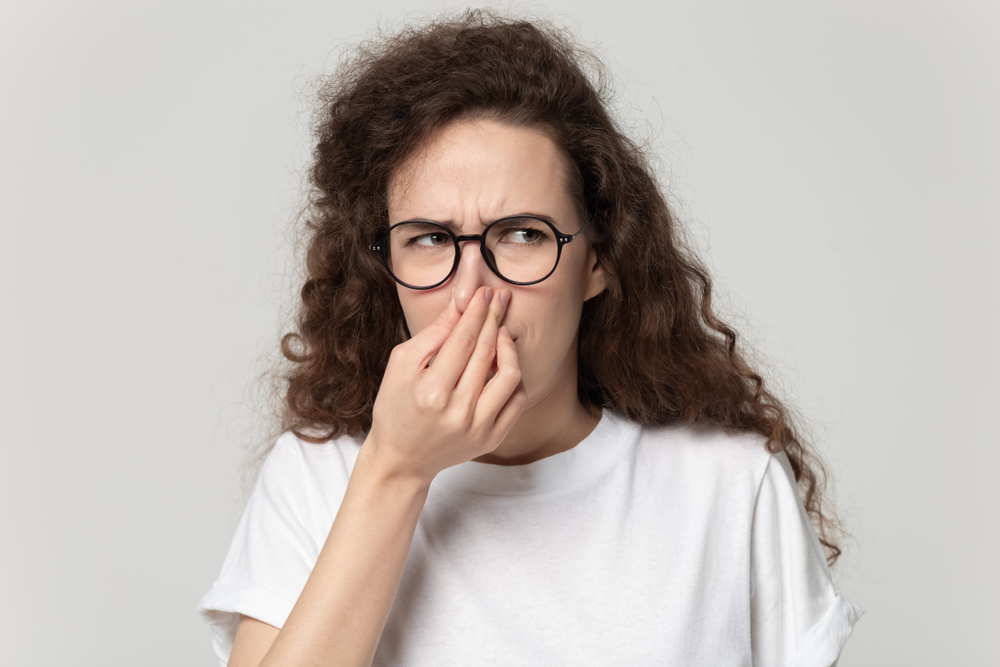Urine is your body’s liquid waste. It is mostly made of water as well as various waste products excreted by the kidneys. It often contains salt, electrolytes, and chemicals called urea and uric acid.
Everyone’s urine has a unique odor, and when you notice a change in that smell, it can be quite alarming. The goods news is that a stronger smell isn’t always a cause for concern. However, in some cases, it can be a sign of an underlying medical problem. This is why learning about common causes of smelly urine can help you determine the root cause. Let’s explore the common causes next!
It’s worth noting if the strong odor persists for several days, or if you’re concerned, speak with our doctor.
Eating Certain Foods
Certain foods may be the culprit to your smelly urine. For starters, asparagus is well known for making urine smelly. This is thanks to asparagusic acid which is a compound high in sulfur. While it’s nontoxic, it can produce a sulfurous odor which can make your pee smell. Keep in mind, this doesn’t happen to everyone.
Other foods that can make your urine smell are fish, onions, and garlic. To help prevent this, you can drink plenty of water while eating these foods to help dilute your urine and in turn, reduce the smell.
Drinking Coffee
Do you start your morning with a cup of coffee and drink coffee throughout the day? Does your pee smell strange, perhaps even with a hint of coffee? Coffee might be the culprit!
This can happen when you drink too much coffee. When your body breaks down the compounds found in coffee, some of them are released into your urine. Healthline explains, “Metabolites from the compounds in coffee may cause your urine to smell like coffee.”
Furthermore, drinking too much caffeine can make you dehydrated. When you’re dehydrated, your urine is more concentrated and in turn, makes the metabolites smell more noticeable.
Dehydration
Dehydration can occur if you don’t drink enough fluids. This can become serious if you don’t recognize the signs of dehydration. For starters, your urine may appear dark yellow or orange in color.
Your urine’s appearance isn’t the only change you’ll notice. If you’re dehydrated your urine may also smell like ammonia. The good news is drinking more fluids can help your urine odor and color turn back to normal and rehydrate you too. However, if you’re experiencing mental confusion, weakness, or any other unusual symptoms, you may have severe dehydration which requires medical treatment immediately.
Kidney Stones
If you have kidney or bladder stones, you may experience smelly urine. Medical News Today explains, “When stones pass through the urinary tract, the risk for UTIs increases and they can cause urine to have an ammonia smell.”
Other symptoms of kidney stones include nausea or vomiting, frequent urination and pain with urination, fever, blood in urine, and pain in your back, side, or groin. Furthermore, kidney disease can cause chemicals in your urine to become concentrated which can resemble the smell of ammonia.
Yeast Infection
Yeast infections happen when there is an overgrowth of the Candida fungus. Some symptoms of a yeast infection include itching, pain, and odorless discharge.
Yeast infections occur in the vagina and not in the urethra, however, the urethra is nearby which may cause your urine to pick up a scent from the infection. A mild yeast infection can clear up in a few days while a moderate to severe infection may take several weeks.
Vitamins
Just like foods, consuming some vitamins may make your pee smell. Your body will get rid of nutrients you don’t need through urination which is why you may notice a strange smell after taking some vitamins.
Vitamins like B6 can give off a strong odor. Vitamin B1 can also make your urine smell like fish. Additionally, B vitamins can also give your urine a bright greenish-yellow color. To ensure you’re taking the right vitamins and the right dosage, speak with your doctor.
Urinary Tract Infection
Dealing with a urinary tract infection (UTI) is never fun and can be quite uncomfortable. Some common symptoms you’ll experience are needing to urinate often, feeling a strong urge to urinate, and a burning sensation while urinating. But that’s not all. UTIs can also commonly cause your urine to smell.
Mayo Clinic explains, “Urinary tract infections typically occur when bacteria enter the urinary tract through the urethra and begin to multiply in the bladder.” If you do have a UTI, your doctor will likely give you antibiotics to treat it.
Diabetes
Diabetes can also cause smelly urine. In this case, it’s often sweet-smelling urine. This can happen when someone has undiagnosed diabetes. The high blood sugar levels can cause a sweet odor. Other signs and symptoms of diabetes include unintentional weight loss, exhaustion, blurred vision, frequent urination, being thirsty all the time, and more.
If you notice that your urine smells sweet often, it’s time to speak with your doctor immediately. Untreated diabetes can be very dangerous and in some cases, even life-threatening!
Pregnancy
Being pregnant can also cause your urine to smell. Change in the smell of your urine could be due to several hormonal changes or your sensitivity to smell.
Furthermore, pregnant women should also drink more water to prevent dehydration. As we learned earlier, dehydration can also lead to strong-smelling urine.
Tips for Reducing Smelly Urine
Having smelly urine isn’t pleasant but thankfully, there are a variety of things you can do to help reduce the smell. For starters, you can avoid eating foods that cause your urine to smell. You can also try switching supplements if certain vitamins are causing smelly urine.
Further, you should also make sure you drink plenty of water to stay hydrated and to support kidney and urinary tract health. Finally, living a generally healthy lifestyle and reducing (or eliminating) alcohol intake can help protect your liver and may help get rid of smelly urine.
When to See a Doctor
Thankfully, most changes to urine odor are temporary and will resolve on their own. They also don’t always mean you have a serious illness. That said, you should speak with your doctor if you’re concerned about the odor of your urine. You should also see a doctor if the smelly urine lasts for several days or if it’s accompanied by other abnormal symptoms.














